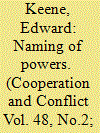| Srl | Item |
| 1 |
ID:
120740


|
|
|
|
|
| Publication |
2013.
|
| Summary/Abstract |
This article offers an historical examination of the evolution of the practice of representing international actors as 'powers', and the classification of them as different kinds of 'power'. It argues that the practice emerged in parallel with the use of the language of sovereign states, and points to the importance of the body of journalistic literature on the 'present state of Europe', to the development of the usage of the term 'powers' and associated ideas about 'interests' and 'pretentions', which it contrasts with the tendency within the body of juristic literature to focus on the 'rights' of 'sovereigns'. It also charts the contrary move in the discourse of powers towards a grading of different classes, whereas the tendency within the discourse of sovereigns was more towards equality, although the article also notes parallel elements of hierarchy within equality. The article concludes by asking how the 'normative power Europe' thesis fits with, but in some cases also departs from, these representational practices. For example, the idea is often used to convey the unique, sui generis nature of the EU's identity as an international actor, whereas the normal tendency within the discourse of powers is towards more generic and class-oriented forms of identity.
|
|
|
|
|
|
|
|
|
|
|
|
|
|
|
|
| 2 |
ID:
191914


|
|
|
|
|
| Summary/Abstract |
Charles Tilly's classical claim that “war made states” in early modern Europe remains controversial. The “bellicist” paradigm has attracted theoretical criticism both within and beyond its original domain of applicability. While several recent studies have analyzed the internal aspects of Tilly's theory, there have been very few systematic attempts to assess its logic with regard to the territorial expansion of states. In this paper, we test this key aspect of bellicist theory directly by aligning historical data on European state borders with conflict data, focusing on the period from 1490 through 1790. Proceeding at the systemic, state, and dyadic levels, our analysis confirms that warfare did in fact play a crucial role in the territorial expansion of European states before (and beyond) the French Revolution.
|
|
|
|
|
|
|
|
|
|
|
|
|
|
|
|